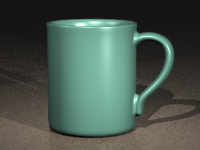
Render the model using the current renderer producing a color image in a separate display window.
The process needed to render scenes consists of four basic steps:

Although the steps do not have to be done in this order, using this method seems to make setting up a scene more efficient. To improve quality, repeat these steps until the image looks right to you.
In the Layer Material dialog box, set up material properties.
Type a letter to navigate to the first material in the list with a name starting with the letter.
The rendering properties include environment settings like background color and image.
Open the Lights panel.
Opens the Environments panel.
Assignment, color, bump, environment map, name, texture, transparency.
Change an object's material color to match its object or layer display color.
Shade objects with a simulation of the rendered view.
Render the view in the render window with a with a rough quality for a fast preview.
 RenderPreviewWindow
RenderPreviewWindow
Render a selected area in the viewport with a rough quality for a fast preview.
 RenderInWindow
RenderInWindow
Render a selected area in the render window at viewport resolution.
 RenderPreviewInWindow
RenderPreviewInWindow
Render a selected area in the render window with a rough quality for a fast preview.
 ShowRenderMesh
ShowRenderMesh
Display the render mesh for selected objects.
 HideRenderMesh
HideRenderMesh
Hide the render mesh displayed with the ShowRenderMesh command.
 ContentFilter
ContentFilter
Open the Content Filter dialog box.
Render the objects using the current renderer.
 RenderArctic
RenderArctic
Set everything to white - materials, skylighting, ground plane and renders the current viewport.
 RenderBlowup
RenderBlowup
Render a selected area of the current viewport in the render window at the resolution specified in the Rendering panel.
 RenderWindow
RenderWindow
Render a selected area in the viewport at viewport resolution.
 RenderInWindow
RenderInWindow
Render a selected area in the render window at viewport resolution.
 SetCurrentRenderPlugIn
SetCurrentRenderPlugIn
Specify a rendering plug-in.
Rhinoceros 6 © 2010-2020 Robert McNeel & Associates. 11-Nov-2020